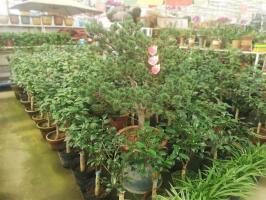How to Get Rid of Termites in a Potted Plant
Termites are small insects that feed on cellulose material such as wood, paper or fabrics. These insects can cause a significant amount of damage to wooden structures, but did you know that they can also infest potted plants? Potted plants provide the ideal environment for termites to thrive, and before you know it, they can destroy your plant altogether. So, how do you get rid of termites in a potted plant?
Identifying Termites in your Potted Plant
The first step in dealing with termites in your potted plant is to identify whether they are present in the plant or not. Check the soil for termite droppings or discarded wings near the pot. The plant may also have holes or tunnels, which are indicative of a termite infestation. You may also notice the leaves turning yellow or the plant wilting. These are all signs that termites may be present.
Removing the Infestation
Once you are sure that you have a termite infestation, it is time to remove the insects from your potted plant. The first step is to remove the plant from the pot and inspect its roots for any signs of infestation. Carefully remove any soil and debris from the roots using a soft brush.
Next, submerge the roots in water that is at or slightly above room temperature for up to 15 minutes. This will help to dislodge any remaining insects and debris. Pat the roots dry with a clean towel before repotting the plant in fresh soil, making sure to discard any contaminated soil or debris.
Preventing Future Infestations
Prevention is always better than cure, and this is certainly true when it comes to termite infestations in potted plants. Here are some steps you can take to prevent future infestations:
Use a good quality potting mix that is free of organic material such as sawdust or mulch, which are attractive to termites.
Water your plant regularly but avoid overwatering, as moisture can attract termites.
Inspect your potted plants regularly for signs of infestation.
Store any unused potting soil in a sealed container to prevent termites from entering.
Use termite-resistant pots made from materials such as plastic, clay or metal. Avoid using wooden or earthenware pots, as they can easily become infested.
If you suspect that your plant has a termite infestation, isolate it from your other plants to prevent the spread of the insects.
Conclusion
Termites can be a frustrating problem to deal with, and if left unchecked, they can cause significant damage to your potted plants. By taking preventative measures and properly removing any infestations, you can help protect your plants from these pesky insects. Remember to regularly inspect your plants for signs of infestation and take action immediately if you spot any issues. With a little effort, you can ensure that your potted plants remain healthy and termite-free.

 how many times do yo...
how many times do yo... how many planted tre...
how many planted tre... how many pine trees ...
how many pine trees ... how many pecan trees...
how many pecan trees... how many plants comp...
how many plants comp... how many plants can ...
how many plants can ... how many plants and ...
how many plants and ... how many pepper plan...
how many pepper plan...
































